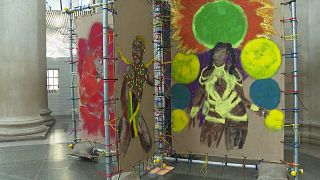United Kingdom
A new solo exhibition by British artist Yinka Shonibare in London explores Britain's imperialist past.
Winston Churchill – a familiar face, but perhaps not quite so familiar in such technicolour.
The British Prime Minister is hailed as a hero for his leadership during the Second World War.
But in recent years, his comments on race and his actions surrounding the Bengal famine of 1943 that left 3 million Indians dead have painted a more troubling legacy.
Churchill is one of the historic figures whose statues have been reimagined by artist Yinka Shonibare.
He has taken the traditional forms we are all used to seeing, and decorated them in his signature Batik patterns.
This is Shonibare’s response to the debate on what to do about historical figures with links to slavery, colonialism and mistreatment of particular ethnic groups.
"People are talking about the idea of actually knocking statues down because of the colonial history of those figures. And I felt that actually the best approach is not to actually knock them down, in the same way that you wouldn't go into a library and start burning the books you didn't like, you know?” he says.
“So I thought that it's actually better to preserve history and for people to actually understand what people did, what Queen Victoria did, what Churchill did. And my approach really is to actually improve them, to make them more beautiful."
"People are complex"
The vibrant statues are part of a new exhibition opening in London.
The British artist spent much of his childhood in Nigeria, and his art often explores the tangled colonial relationships between Africa and Europe.
But he’s balanced in his judgement of past leaders and the decisions they made.
"I think human beings are very complicated. No one is just a villain or no one is just good. And I think that's what's very important about those debates because people are very complex. And also, somebody who lived in the 19th century is not the same as the person living today. And you can't really conflate ideas or the values of the 19th century with our values. We are different people. So it's important that we understand them in the context in which they existed," says Shonibare.
The importance of memory
A highlight of the exhibition is ‘The War Library’, an installation of more than 5,000 books about conflicts.
There are peace treaties bound in printed cotton, covering countries in Africa, Europe, the Middle East, Asia and beyond.
There are even volumes on the shelves with no titles at all – symbolising deadly conflicts that have not yet happened, but are inevitable.
These shelves of incongruously decorated publications serve to remind us that no matter the horrors of war and the hard-won ceasefires and armistices, humans seem destined to continue to fight each other.
"The point of The War Library is actually amnesia, to expose our amnesia, to show that we always repeat the same thing over and over again. And also the importance of the archives, the importance of memory, and to also see that actually, we've had many, many peace treaties and we've tried to resolve a lot of the conflicts, but for some reason we keep going back to the same place," says Shonibare.
Accommodating others
And what of the people most affected by wars, those who are displaced from their homes?
One darkened room contains models of real-world buildings that have been used to shelter refugees and persecuted people.
From churches, to schools, to the headquarters of Amnesty International, they have all had a place in keeping people safe.
Glowing windows shine like beacons in the gloom.
The artist wants people to reflect on how they treat those in need of help.
"I think that people have always been concerned about people they don't know, whose customs they don't quite understand. There's a series of quilts in this exhibition called Creatures of the Mappa Mundi. So even in the medieval period, people were scared of people they didn't quite know. In a way that's understandable. But we must we must endeavour to be more sympathetic and to be more accommodating, because we could actually become refugees if there was a natural disaster," he says.
The ‘Suspended States’ exhibition opens at the Serpentine Gallery on 12 April and closes on 1 September.













Go to video
Morocco: United Kingdom withdraws from renewable energy project
01:53
India plane crash: Amit Shah confirms 1 survivor, offers condolences
00:42
Air India flight crashes on takeoff in Ahmedabad, over 100 onboard
01:29
Several Western governments sanction two far-right Israeli ministers
01:59
Algerian international player, Rayan Ait-Nouri, joins Manchester City
01:15
Gaza officials say Israel kills more than 30 people near aid distribution site